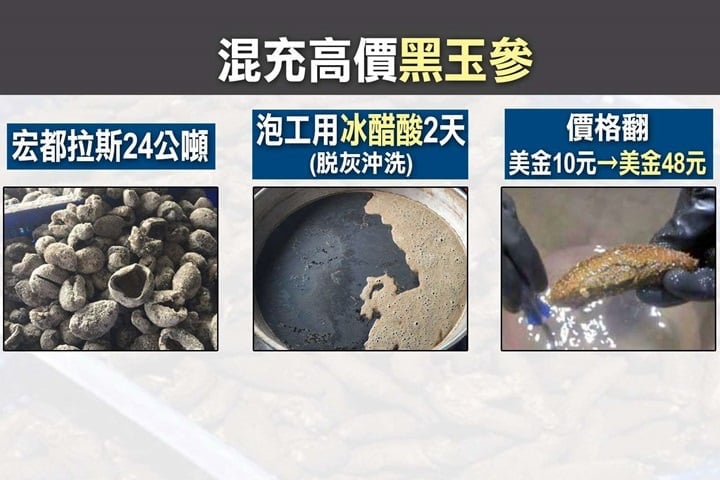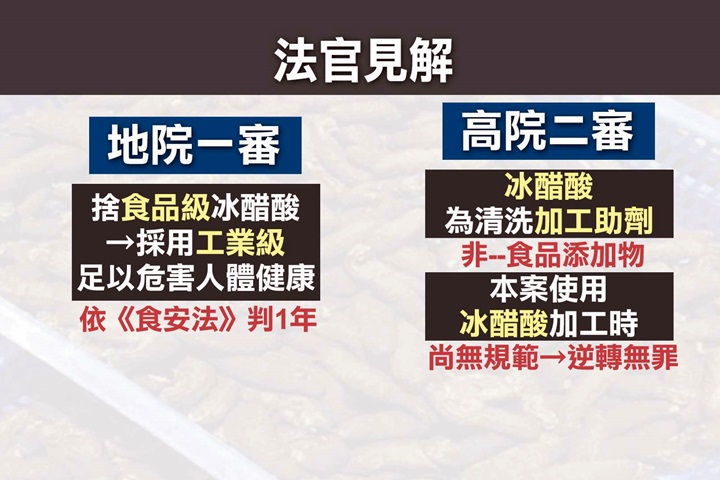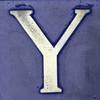Now FAKED and POISONed Sea Cucumbers! Click here for video:
https://tw.news.yahoo.com/video?playIdx=2
工用冰醋酸毒性低 假海參業者逆轉無罪
民視影音
8 小時前
3年前,檢方接獲檢舉,新北市一名海產業者,拿工用「冰醋酸」清洗便宜烏參,再佯裝成高價「黑玉參」,轉售香港牟利。一審法官依《食安法》將業者判刑一年,但二審法官審酌專家意見,認為工用冰醋酸,為「清洗助劑」不算「食品添加物」,加上法規沒規範,二審逆轉判無罪。
圍爐桌上不管是佛跳牆,還是什錦燴海鮮,都少不了口感Q彈的海參與烏參,但好料端上桌前,烏參長這樣,您還吞的下去嗎?
新北市衛生局3年前接獲檢舉,說三重有一名黑心業者,從宏都拉斯進口24噸,白白灰灰的便宜海參,泡在工業用冰醋酸整整兩天後,價格翻了快5倍,變成貴鬆鬆的「黑玉參」。以此作法牟利,在乾貨業界早有耳聞。

空間不大的廠房,堆滿一桶桶高濃度的工用冰醋酸。業者用橘色大水桶「發海參」,被人檢舉,檢警火速起訴。
案件進入地院一審,法官認為業者為求降低成本,用危害人體的工業用冰醋酸,依《食安法》判刑一年;但二審法官審酌水產專家意見,認為冰醋酸是拿來作清洗加工助劑、毒性低,不算食品添加物,而且國內沒有相關規範,逆轉判業者無罪。

開南商工實驗研究教師張丕白認為,「你想一個事情如果法律不罰,大家就會拚命做這個事情,對於國人的生命健康造成不良的影響。」
迪化街乾貨業者郭先生表示,「單價一斤都要7000多元,它只有發五斤,所以它成本就要到1500元,所以你看我們菜市場買的,一斤300、400元的海參,他是用更便宜的海參,加藥水發到十幾倍以後,一斤賣300、400元,煮到滾以後10分鐘你去看,它就會縮到沒有。」
高濃度的工用冰醋酸,人體觸碰後容易灼傷或造成結膜炎、皮膚腐蝕潰爛。一、二審法官見解天差地遠,爭議未了,全案還能上訴。
(民視新聞/薛嘉瑩、劉毓琦、林嘉玫、胡希哲 台北報導)
登入後即可張貼留言。
1 位正在檢視

Ficks
6 小時前
台灣真的好爽....就請那法官吃一年吧....

作者:n-wordbelike,發表於


小猴子
8 小時前
難怪台灣是犯罪天堂 罪犯們最愛台灣的法官了

喬
5 小時前
台灣真是一個有法無理的鳥國!
相關新聞
https://en.wikipedia.org/wiki/2014_Taiwan_food_scandal
2014 Taiwan food scandal
From Wikipedia, the free encyclopedia

This article may be expanded with text translated from the corresponding article in Chinese. (September 2014) Click [show] for important translation instructions. [show]
The 2014 Taiwan food scandal refers to a series of food safety incidents in Taiwan that came to light in 2014. Adulteration of cooking oil with recycled waste oil and animal feed oil was discovered in September 2014.[1][2] Despite coming to light only in 2014, mass food adulteration by Taiwanese food conglomerates, however, has been suppressed for decades, and the food safety crisis has been among the reasons for the electoral defeat of the Kuomintang in late 2014. At least 1,256 businesses were affected in the gutter oil scandal.[3][4] In November 2014 it was found that dried tofu products (a.k.a. dougan 豆乾) have been adulterated with an industrial dye, methyl yellow (a.k.a. dimethyl), for some 20 years.[5] In December 2014, it was furthermore found that even regular non-dyed tofu has been found contaminated with carcinogens, resulting in over 25,000 kg recalled.[6]
Contents
Chronology
Gutter oil scandal
First case
The series of incidents first came to light on 4 September 2014, when it was discovered that tainted cooking oil was being produced by Kaohsiung-based company Chang Guann Co. (強冠企業) and branded as Chuan Tung Fragrant Lard Oil (全統香豬油).[7] The company was found to have blended cooking oil with recycled oil, grease and leather cleaner. The recycled oil was processed by an unlicensed factory in Pingtung County owned by Kuo Lieh-cheng (郭烈成), who allegedly purchased the oil from waste recycler Hu Hsin-te (胡信德), whose factory is named Shun Te Enterprises (順德企業行), located in the Daliao District of Kaohsiung.[8][9]
Chang Guann purchased up to 243 tonnes of recycled waste oil disguised as lard from the Pingtung factory, starting in February 2014. The company then allegedly refined the waste oil before mixing it with processed lard and selling the tainted product to its distributors. The recycled waste oil was collected from restaurants, and included discarded animal parts, fat and skin.
The President of Chang Guann Co. apologized to the public on 4 September 2014. He emphasized that his company was not aware and did not intentionally buy the tainted oil, and that the oil the company purchased from the illegal Pingtung factory was not cheaper than oil from other oil suppliers.[7]
On 11 September, reports revealed that in 2014, Chang Guann had also imported 87.72 tonnes of lard oil falsely listed for human consumption from Hong Kong-based Globalway Corp Ltd. (金寶運貿易) that were actually meant for animal use only. Since 2008, Chang Guann had imported 56 batches of lard oil weighing 2,385.1 tonnes from Hong Kong, about 300 tonnes of which were purchased from Globalway Corp between 2011 and 2014.[10]
The Taiwan Food Good Manufacturing Practice Development Association (TFGMPDA) reported that the cooking oil produced by Chang Guann has never been awarded GMP certification, although the TFGMPDA issued an apology saying that five food companies whose products have won GMP certification have used the tainted oil.[11]
Schools around Taiwan pulled all of the products containing the tainted oil from their school meals after 16 schools were discovered to be using the adulterated oil products.[12]
Chang Guann was found in violation of the Act Governing Food Safety and Sanitation and fined NT$50 million.[3] Yeh Wen-hsiang (葉文祥), chairman of Chang Guann, was arrested for fraud for his role in the scandal.[13][14]
The FDA began indefinitely halting imports of edible lard oil from Hong Kong on 11 September.[10]
On 1 October, prosecutors revealed that after viewing lab results, Kuo Lieh-cheng admitted that oil he sold to Chang Guann Co. was mixed with corpse oil, gutter oil, grease and leather cleaner, and recycled oil.[15]
On 3 October the Minister of Health and Welfare Chiu Wen-ta resigned in the aftermath of the scandal.[16]
Second case
On 9 October, prosecutors launched an investigation into a unit of Ting Hsin International Group (頂新國際集團) over sale of alleged tainted cooking oil. Prosecutor Tsai Li-yi said Ting Hsin unit Cheng-I Food Co. (正義股份有限公司) is being investigated over allegedly mixing animal feed oil with cooking oil and then selling it for human consumption.[17] Cheng-I Food Co. has an estimated 80 percent share of the lard and lard-based oil market in Taiwan.[18] Wei Ying-chung (魏應充), former chairman of three subsidiaries within Ting Hsin International Group and third of the four Wei brothers controlling the conglomerate, was previously indicted on charges of fraud as part of an investigation into the 2013 Taiwan food scandal.[19]
After the revelations, the Taiwan public boycotted Ting Hsin items, with a number of local governments, restaurants, traditional markets and schools refusing to consume the conglomerate's products.[20] On 16 October, Ting Hsin announced that it will leave Taiwan's oil market and donate NT$3 billion toward food safety under the supervision of Ruentex Financial Group (潤泰集團) Chairman Samuel Yin.[21]
On 17 October, the Changhua District Court granted a request to detain Wei Ying-chung.[22] On October 21, prosecutors said according to Ting Shin's Vietnamese oil supplier Dai Hanh Phuc, the majority of animal feed-grade oil imported by Ting Shin may be used in the China market.[23] In response, consumers in China called for a united boycott against Ting Hsin products.[24]
In November 2014, Ting Hsin's products were tested for Agent Orange since an unnamed source told authorities that the oil Ting Hsin imported from Vietnam may contain traces of the herbicidal weapon.[25]
The Kaohsiung District Court ruled that Cheng-I Food owed NT$9.36 million in damages.[26]
Third case
On 3 November, prosecutors in Tainan took Lu Ching-hsieh, owner of Beei Hae Edible Co. and Hsieh Ching Corp. and his wife, Lu Huang Li-hua, into custody on suspicion of manufacturing cooking oil using substandard oil. Prosecutors said Hsieh Ching had bought animal feed-grade beef tallow and vegetable oil from Jin Hong, a trading company, and then allegedly mixed the ingredients together for sale as cooking oil.[27]
Industrial dye scandal
Tofu and seasoning products from Taiwanese manufacturers have been found adulterated in the latest of a string of related scandals beginning in November 2014. The scandal was initially uncovered by Hong Kong authorities regarding the many flavored types of dried preserved tofu, that were recalled for toxic industrial dye methyl yellow contamination, after investigation it was confirmed that this adulteration had been going on undetected for over 20 years. A major supplier to 44 manufacturers, Chien Hsin Enterprises (芊鑫實業社) of Tainan city was implicated as the origin. Despite that methyl yellow can often be detected by color (bright yellow), a further scandal erupted in the following days regarding regular tofu (white or oil color if fried). Regular tofu products were also found to be contaminated with a carcinogen. At least 25,760 kg of deliberately contaminated emulsifier for tofu have been traced to the distributor.[6] In the following days, ramen noodle seasoning packets were also found to be contaminated with methyl yellow, include some popular major ramen manufacturers previously implicated in the prior gutter oil scandals[28] These products are exported worldwide, including USA, Singapore, Malaysia, Indonesia, Canada, Australia, Vietnam, Hong Kong, and China, in Western countries primarily on shelves of Asian food stores. As of Dec 18, these 73 products (in chinese) have been recalled related to methyl yellow contamination.
Affected companies
According to Taiwan's Food and Drug Administration (FDA), a number of companies made food products using the tainted oil, including well-known brands such as Taiwan Sugar Corporation, Ve Wong Corp. (味王), Chi Mei Frozen Food Co. (奇美食品), Sheng Hsiang Jen Foods Co. (盛香珍食品), Gourmet Master Co. (美食達人), Yilin Group (憶霖), Hawdii Foods Co. (好帝一食品有限公司), etc. Restaurant chains, shops and stores were also affected, such as Good Morning (早安美芝城), Wu Wha Ma Dumpling Home (五花馬), Magie du Levain (樂金食品), Yu Jen Jai (玉珍齋), Lee Hou Cake Store (李鵠餅店), Black Bridge Foods (黑橋牌食品), Li Ji Cake Store (犁記餅店), etc.[29][30][31]
Wei-Chuan Food Corporation (味全), a subsidiary of Ting Hsin International Group which was previously cited with using adulterated cooking oil in 2013, was also involved in using tainted cooking oil produced by Chang Guann. Its share price plummeted after the company announced a recall of 12 products made from the recycled oil: canned pork, pork sauces, meat paste and pork floss. The company promised refunds to its customers. The recall announcement subsequently also brought down the share prices of other related food companies.[32][33][34][35][36]
Reactions
Taiwan
The General Administration of Quality Supervision, Inspection and Quarantine carefully examined the past records of the claimed-affected companies and restaurants. They also warned customers to be cautious of food products that may contain the tainted oil.[45]
Hong Kong
Secretary for Food and Health Ko Wing-man said that the Hong Kong Government would check whether any food imported into the region had any tainted oil from Taiwan. The authorities would try to trace the buyers of the tainted oil.[46] On 10 October, health authorities ordered a total ban on and the recall of all animal oils imported from Taiwan.[47]
Macau
The Government of Macau was criticized because of lax inspection of food ingredient imports, although the authorities had earlier said that at least 21 local food manufacturers and retailers had been using oils supplied by Chang Guann Co.[48]
Philippines
The Food and Drug Administration told businesses to pull questionable Taiwanese food products off shelves and said that the Philippines would accelerate signing a memorandum on cooperation with Taiwan on strengthening food safety checks.[49]
Singapore
The Agri-Food and Veterinary Authority of Singapore conducted tests on suspicious food items imported from Taiwan. The incident also prompted some retailers in the country to seek clarification from their Taiwanese suppliers. Travel agencies also prevented Singaporeans from buying suspected tainted products in Taiwan.[50]
See also
https://tw.news.yahoo.com/video?playIdx=2
工用冰醋酸毒性低 假海參業者逆轉無罪
民視影音
8 小時前
3年前,檢方接獲檢舉,新北市一名海產業者,拿工用「冰醋酸」清洗便宜烏參,再佯裝成高價「黑玉參」,轉售香港牟利。一審法官依《食安法》將業者判刑一年,但二審法官審酌專家意見,認為工用冰醋酸,為「清洗助劑」不算「食品添加物」,加上法規沒規範,二審逆轉判無罪。
圍爐桌上不管是佛跳牆,還是什錦燴海鮮,都少不了口感Q彈的海參與烏參,但好料端上桌前,烏參長這樣,您還吞的下去嗎?
新北市衛生局3年前接獲檢舉,說三重有一名黑心業者,從宏都拉斯進口24噸,白白灰灰的便宜海參,泡在工業用冰醋酸整整兩天後,價格翻了快5倍,變成貴鬆鬆的「黑玉參」。以此作法牟利,在乾貨業界早有耳聞。

空間不大的廠房,堆滿一桶桶高濃度的工用冰醋酸。業者用橘色大水桶「發海參」,被人檢舉,檢警火速起訴。
案件進入地院一審,法官認為業者為求降低成本,用危害人體的工業用冰醋酸,依《食安法》判刑一年;但二審法官審酌水產專家意見,認為冰醋酸是拿來作清洗加工助劑、毒性低,不算食品添加物,而且國內沒有相關規範,逆轉判業者無罪。

開南商工實驗研究教師張丕白認為,「你想一個事情如果法律不罰,大家就會拚命做這個事情,對於國人的生命健康造成不良的影響。」
迪化街乾貨業者郭先生表示,「單價一斤都要7000多元,它只有發五斤,所以它成本就要到1500元,所以你看我們菜市場買的,一斤300、400元的海參,他是用更便宜的海參,加藥水發到十幾倍以後,一斤賣300、400元,煮到滾以後10分鐘你去看,它就會縮到沒有。」
高濃度的工用冰醋酸,人體觸碰後容易灼傷或造成結膜炎、皮膚腐蝕潰爛。一、二審法官見解天差地遠,爭議未了,全案還能上訴。
(民視新聞/薛嘉瑩、劉毓琦、林嘉玫、胡希哲 台北報導)
登入後即可張貼留言。
1 位正在檢視

Ficks
6 小時前
台灣真的好爽....就請那法官吃一年吧....

作者:n-wordbelike,發表於


小猴子
8 小時前
難怪台灣是犯罪天堂 罪犯們最愛台灣的法官了

喬
5 小時前
台灣真是一個有法無理的鳥國!
相關新聞
https://en.wikipedia.org/wiki/2014_Taiwan_food_scandal
2014 Taiwan food scandal
From Wikipedia, the free encyclopedia

This article may be expanded with text translated from the corresponding article in Chinese. (September 2014) Click [show] for important translation instructions. [show]
The 2014 Taiwan food scandal refers to a series of food safety incidents in Taiwan that came to light in 2014. Adulteration of cooking oil with recycled waste oil and animal feed oil was discovered in September 2014.[1][2] Despite coming to light only in 2014, mass food adulteration by Taiwanese food conglomerates, however, has been suppressed for decades, and the food safety crisis has been among the reasons for the electoral defeat of the Kuomintang in late 2014. At least 1,256 businesses were affected in the gutter oil scandal.[3][4] In November 2014 it was found that dried tofu products (a.k.a. dougan 豆乾) have been adulterated with an industrial dye, methyl yellow (a.k.a. dimethyl), for some 20 years.[5] In December 2014, it was furthermore found that even regular non-dyed tofu has been found contaminated with carcinogens, resulting in over 25,000 kg recalled.[6]
Contents
Chronology
Gutter oil scandal
First case
The series of incidents first came to light on 4 September 2014, when it was discovered that tainted cooking oil was being produced by Kaohsiung-based company Chang Guann Co. (強冠企業) and branded as Chuan Tung Fragrant Lard Oil (全統香豬油).[7] The company was found to have blended cooking oil with recycled oil, grease and leather cleaner. The recycled oil was processed by an unlicensed factory in Pingtung County owned by Kuo Lieh-cheng (郭烈成), who allegedly purchased the oil from waste recycler Hu Hsin-te (胡信德), whose factory is named Shun Te Enterprises (順德企業行), located in the Daliao District of Kaohsiung.[8][9]
Chang Guann purchased up to 243 tonnes of recycled waste oil disguised as lard from the Pingtung factory, starting in February 2014. The company then allegedly refined the waste oil before mixing it with processed lard and selling the tainted product to its distributors. The recycled waste oil was collected from restaurants, and included discarded animal parts, fat and skin.
The President of Chang Guann Co. apologized to the public on 4 September 2014. He emphasized that his company was not aware and did not intentionally buy the tainted oil, and that the oil the company purchased from the illegal Pingtung factory was not cheaper than oil from other oil suppliers.[7]
On 11 September, reports revealed that in 2014, Chang Guann had also imported 87.72 tonnes of lard oil falsely listed for human consumption from Hong Kong-based Globalway Corp Ltd. (金寶運貿易) that were actually meant for animal use only. Since 2008, Chang Guann had imported 56 batches of lard oil weighing 2,385.1 tonnes from Hong Kong, about 300 tonnes of which were purchased from Globalway Corp between 2011 and 2014.[10]
The Taiwan Food Good Manufacturing Practice Development Association (TFGMPDA) reported that the cooking oil produced by Chang Guann has never been awarded GMP certification, although the TFGMPDA issued an apology saying that five food companies whose products have won GMP certification have used the tainted oil.[11]
Schools around Taiwan pulled all of the products containing the tainted oil from their school meals after 16 schools were discovered to be using the adulterated oil products.[12]
Chang Guann was found in violation of the Act Governing Food Safety and Sanitation and fined NT$50 million.[3] Yeh Wen-hsiang (葉文祥), chairman of Chang Guann, was arrested for fraud for his role in the scandal.[13][14]
The FDA began indefinitely halting imports of edible lard oil from Hong Kong on 11 September.[10]
On 1 October, prosecutors revealed that after viewing lab results, Kuo Lieh-cheng admitted that oil he sold to Chang Guann Co. was mixed with corpse oil, gutter oil, grease and leather cleaner, and recycled oil.[15]
On 3 October the Minister of Health and Welfare Chiu Wen-ta resigned in the aftermath of the scandal.[16]
Second case
On 9 October, prosecutors launched an investigation into a unit of Ting Hsin International Group (頂新國際集團) over sale of alleged tainted cooking oil. Prosecutor Tsai Li-yi said Ting Hsin unit Cheng-I Food Co. (正義股份有限公司) is being investigated over allegedly mixing animal feed oil with cooking oil and then selling it for human consumption.[17] Cheng-I Food Co. has an estimated 80 percent share of the lard and lard-based oil market in Taiwan.[18] Wei Ying-chung (魏應充), former chairman of three subsidiaries within Ting Hsin International Group and third of the four Wei brothers controlling the conglomerate, was previously indicted on charges of fraud as part of an investigation into the 2013 Taiwan food scandal.[19]
After the revelations, the Taiwan public boycotted Ting Hsin items, with a number of local governments, restaurants, traditional markets and schools refusing to consume the conglomerate's products.[20] On 16 October, Ting Hsin announced that it will leave Taiwan's oil market and donate NT$3 billion toward food safety under the supervision of Ruentex Financial Group (潤泰集團) Chairman Samuel Yin.[21]
On 17 October, the Changhua District Court granted a request to detain Wei Ying-chung.[22] On October 21, prosecutors said according to Ting Shin's Vietnamese oil supplier Dai Hanh Phuc, the majority of animal feed-grade oil imported by Ting Shin may be used in the China market.[23] In response, consumers in China called for a united boycott against Ting Hsin products.[24]
In November 2014, Ting Hsin's products were tested for Agent Orange since an unnamed source told authorities that the oil Ting Hsin imported from Vietnam may contain traces of the herbicidal weapon.[25]
The Kaohsiung District Court ruled that Cheng-I Food owed NT$9.36 million in damages.[26]
Third case
On 3 November, prosecutors in Tainan took Lu Ching-hsieh, owner of Beei Hae Edible Co. and Hsieh Ching Corp. and his wife, Lu Huang Li-hua, into custody on suspicion of manufacturing cooking oil using substandard oil. Prosecutors said Hsieh Ching had bought animal feed-grade beef tallow and vegetable oil from Jin Hong, a trading company, and then allegedly mixed the ingredients together for sale as cooking oil.[27]
Industrial dye scandal
Tofu and seasoning products from Taiwanese manufacturers have been found adulterated in the latest of a string of related scandals beginning in November 2014. The scandal was initially uncovered by Hong Kong authorities regarding the many flavored types of dried preserved tofu, that were recalled for toxic industrial dye methyl yellow contamination, after investigation it was confirmed that this adulteration had been going on undetected for over 20 years. A major supplier to 44 manufacturers, Chien Hsin Enterprises (芊鑫實業社) of Tainan city was implicated as the origin. Despite that methyl yellow can often be detected by color (bright yellow), a further scandal erupted in the following days regarding regular tofu (white or oil color if fried). Regular tofu products were also found to be contaminated with a carcinogen. At least 25,760 kg of deliberately contaminated emulsifier for tofu have been traced to the distributor.[6] In the following days, ramen noodle seasoning packets were also found to be contaminated with methyl yellow, include some popular major ramen manufacturers previously implicated in the prior gutter oil scandals[28] These products are exported worldwide, including USA, Singapore, Malaysia, Indonesia, Canada, Australia, Vietnam, Hong Kong, and China, in Western countries primarily on shelves of Asian food stores. As of Dec 18, these 73 products (in chinese) have been recalled related to methyl yellow contamination.
Affected companies
According to Taiwan's Food and Drug Administration (FDA), a number of companies made food products using the tainted oil, including well-known brands such as Taiwan Sugar Corporation, Ve Wong Corp. (味王), Chi Mei Frozen Food Co. (奇美食品), Sheng Hsiang Jen Foods Co. (盛香珍食品), Gourmet Master Co. (美食達人), Yilin Group (憶霖), Hawdii Foods Co. (好帝一食品有限公司), etc. Restaurant chains, shops and stores were also affected, such as Good Morning (早安美芝城), Wu Wha Ma Dumpling Home (五花馬), Magie du Levain (樂金食品), Yu Jen Jai (玉珍齋), Lee Hou Cake Store (李鵠餅店), Black Bridge Foods (黑橋牌食品), Li Ji Cake Store (犁記餅店), etc.[29][30][31]
Wei-Chuan Food Corporation (味全), a subsidiary of Ting Hsin International Group which was previously cited with using adulterated cooking oil in 2013, was also involved in using tainted cooking oil produced by Chang Guann. Its share price plummeted after the company announced a recall of 12 products made from the recycled oil: canned pork, pork sauces, meat paste and pork floss. The company promised refunds to its customers. The recall announcement subsequently also brought down the share prices of other related food companies.[32][33][34][35][36]
Reactions
Taiwan
- President Ma Ying-jeou made a public statement saying that the oil scandal happened due to lax inspection of food manufacturing factories by local governments, and he urged local municipalities to strengthen checks on those facilities.[37] Democratic Progressive Party spokesman Huang Di-ying said President Ma should not shift the blame solely to the local governments since Chang Guann Co. has also allegedly imported over 2,400 tonnes of industrial-grade lard from Hong Kong over the last six years, with no foul play spotted by the central government.[38]
- Premier Jiang Yi-huah demanded the Legislative Yuan officials ensure food products containing the adulterated cooking oil be removed from store shelves and sealed. He also vowed to punish severely those who were involved in the making of the recycled oils, even though they met food safety standards.[39]
- Vice Premier Mao Chi-kuo described the selling of recycled oil by Chang Guann Co. as a vile criminal act and demanded the most severe penalties for the perpetrators.
- The Ministry of Health and Welfare commissioned a group of experts to examine the health implications of consuming the illegal cooking oil. The FDA immediately released a list of 235 food companies around Taiwan that had reportedly purchased the tainted oil products. They also tested the tainted oil for any heavy metals, aflatoxin and benzopyrene, which may cause cancer in humans. However, they came out with a conclusion that products from the tainted oil do not pose any immediate health effects because 67% of the oil was still genuine, although the remaining adulterated materials require further examination.[40]
- Minister of Economic Affairs Woody Duh urged the Taiwanese food companies to increase their level of alert when obtaining materials for their products and to make onsite inspections at their suppliers' production facilities.[41] The Industrial Development Bureau of the ministry plans to implement a full-scale monitoring system to trace the sources of raw materials and check the quality of all finished processed food products to prevent future similar incidents.[11]
- Investigators from the Ministry of Justice went through the bank accounts belonging to the companies and individuals involved in the tainted oil case to ensure all of their illegal gains were confiscated.
- The Ministry of National Defense removed all food products that could contain the tainted oil from its military stores serving the armed forces.
- The Criminal Investigation Bureau of the National Police Agency, accompanied by environmental and health officials, raided and swept the unlicensed Pingtung factory. Investigators found that the low-grade oil refined from food waste had been procured by several other companies and repackaged as lard oil to be sold to clients, and it was expected that at least around 200 tonnes of the oil had entered the market.[42]
- The Department of Health of Kaohsiung City Government fined Chang Guann Co. NT$50 million, the highest that can be imposed on violations under Article 15-1 of the Act Governing Food Safety and Sanitation (食品安全衛生管理法). The city's Economic Development Bureau also shut down Shun Te Enterprises after it was found to be unregistered.
- Two separate protests occurred in front of the Executive Yuan, on 12 September and 17 October, demanding the resignations of Jiang and later Ma.[43][44]
The General Administration of Quality Supervision, Inspection and Quarantine carefully examined the past records of the claimed-affected companies and restaurants. They also warned customers to be cautious of food products that may contain the tainted oil.[45]
Hong Kong
Secretary for Food and Health Ko Wing-man said that the Hong Kong Government would check whether any food imported into the region had any tainted oil from Taiwan. The authorities would try to trace the buyers of the tainted oil.[46] On 10 October, health authorities ordered a total ban on and the recall of all animal oils imported from Taiwan.[47]
Macau
The Government of Macau was criticized because of lax inspection of food ingredient imports, although the authorities had earlier said that at least 21 local food manufacturers and retailers had been using oils supplied by Chang Guann Co.[48]
Philippines
The Food and Drug Administration told businesses to pull questionable Taiwanese food products off shelves and said that the Philippines would accelerate signing a memorandum on cooperation with Taiwan on strengthening food safety checks.[49]
Singapore
The Agri-Food and Veterinary Authority of Singapore conducted tests on suspicious food items imported from Taiwan. The incident also prompted some retailers in the country to seek clarification from their Taiwanese suppliers. Travel agencies also prevented Singaporeans from buying suspected tainted products in Taiwan.[50]
See also
